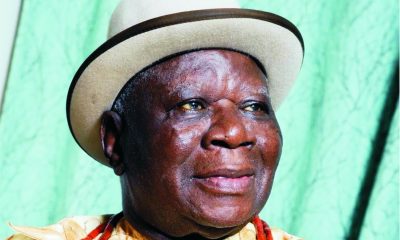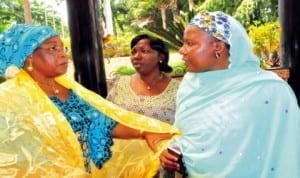Women
Female Stress Syndrome: Coping With Menstrual Disorders
Menstruation, the be
ginning of the Ovarian formation and reproductive years of the woman is a stage that forms the active part of the woman’s lifespan. It begins at the age of 12-14 and last till about 50-55. Though a natural experience it has so far constituted a major stress syndrome particularly in recent times when medical awareness even the trado-medicine has given it an undue popularity to the extent that it has interfered with the woman’s daily life.
The first menstruation known as the menarche and the last of it, the menopause, each has its accompanied stresses. Being married or bearing children sometimes seems to increase the likelihood of the stress and has also formed a major platform of divorce in recent times.
For these problems, the Natural Remedy Encyclopedia (Sixth Edition) revealed that there are over 150 symptoms that are linked to it with the most common of them being abdominal bloating, anxiety, backache, breast swelling, acne, depression, cramps, fainting spells, fatigue, joint pain, Insomnia, nervousness, drastic mode swings, constipation, dizziness, skin eruptions, impatience, lethargy, indecisiveness, angry outbursts among others.
Hormonal imbalance however, has been a major cause of the menstrual stress syndrome which a number of women are unaware of and this is how it works. The liver regulates the hormonal balance by selectively filtering out of the blood and excreting unwanted excess hormones. One of these hornones is “estradiol,’ a type of estrogen which causes problems. If not eliminated, it can build up in the body posing the stresses.
‘Part of the issues of hormonal imbalance is that there is too much estrogen in the body and not enough progesterone. Fluid retention is the result. This affects the circulation and impedes Oxygen and nutrient flow to the brain and female organs’.
“Unfortunately, due to sheer ignorance and possible undue and difficult experiences during these disorders, a lot of women have resorted to patronising every and any quack especially of the tra-do-herbals who have taken advantage of the situation and are established at every nook and cranny of the city and only Godknows what they are administering to these women all in the name of curing these stresses.”
Some of these disorders include Amenonhea, Dysmenorrhea, Metrorrhagia, Oligomenorrhea, Menstrual Cramps etc. Each of these can pose so ugly an experience for the woman whether a housewife, working mother, business woman or even the adolescent school girl, especially when it comes suddenly not minding that she can be outside of the home, on the street, office or on the road.
Amenorrhea, the absence of menstrual periods for a least three months in women who would otherwise be menstruating regularly is of two types; the primary Amenorrhea and Secondary Amenorrhea.
The primary refers to menstruation that has not started by the age of 16. If the condition later stops at anytime longer than three months, then it is considered the secondary.
However, a late menstrual period that is accompanied by severe abdominal pain should receive immediate medical attention because it could be due to an ectopic pregnancy (a pregnancy that develops outside the uterus) usually in one of the fallopian tubes) while a single but heavy period that is late may be as a result of miscarriage.
Dysmenorrhea is the painful or difficult menstruation. Also of the primary and secondary type, the primary occurs in the early teens sometimes not until several years after the menstruation begins. The pain begins a few hours before or at the onset of bleeding which may last from a few hours to one to two days and generally worst at the first day. At first there is a scanty flow which increases as the pain subsides.
The secondary type may start two to three days before onset, with pain in the abdomen, small at the back and down the legs. It is a more constant pain but includes sharp cramps and continues throughout the period. This type is often linked to a pelvic disorder including inflammation, uterine malposition, tumours which needs to be eliminated for the pain to subside or entirely removed.
Menorrhagia is the menstrual periods that are heavier than normal and sometimes irregular. Some women have heavier flows than others which can lasts longer than seven days and difficult to be controlled by the simple pads.
General debility is a primary cause and this condition occurs more frequently in women with kidney or liver disease. Marital excess is still another cause. More common when approaching menopause, this condition may be as a result of uterine polyps, fibroids or cancer of the uterus. The condition is also more common in overweight women. For some, the periods could have always been heavy which may not call for concern. Yet there may be an underlying problem. If not checked, profuse menstruation can lead to difficult urination, displaced womb or leucorrhea. It can also produce iron deficiency anemia causing lightheadedness and fatique.
The Oligomenorrhea, on the other hand is an extremely scanty or insufficient menstrual flow which is inadequate to provide thorough cleansing. This disorder may be caused by stress, depression, too much exercise, chronic or severe illness or extreme weight loss. It could also be due to a disorder in the ovaries or uterus.
Another type is the menometrorrhagia. It is a menstrual cycle that has wide variations in the length of time between periods.
Although average menstrual cycle is 28 days they may occur as offen as every 24 days or as infrequently as every 34 days. After puberty, most women develop a regular cycle but, for some, they remain irregular even in the bleeding it self which normally last two to four days with the average length being five days. Wide variations are common at puberty, the first few months after childbirth and as menopause approaches.
Alongside other causes, variations can be as a result of endometriosis, a situation in which fragments of the tissue that normally lines the uterus are displaced and attached to other pelvic organs.
Whichever condition the woman may be facing, it is never a pleasant one. A disorder in menstruation often indicates the general state of a woman’s health. Usually the result of nutritional deficiencies or antointoxicatition caused by constipation, an organic malfunction; drugs, vitamin or mineral deficiency and/or chemicals and stress, these disorder have almost become part of more than 80 percent of the women of that age.
However, women whose general health and resistance are good are less likely to have menstrual problems.
“Unfortunately too, at this time when the society is giving so much credence to the devil and its mechanisations, some women are no longer finding the experiences of menstrual problems as ordinary medical issue but also having evil undertones to the extent that some so-called churches now have as their main function currying menstrual disorders as against salvation of the souls.”
It therefore becomes pertinent that every woman pursue with diligence issues of her health and its maintenance by adopting simple health habits possibly through the following steps:
-Eating simply and lightly especially of fresh and clean fruits and vegetables
-Taking vitamins B Complex (B12,B6, Folic Acid)C, E and Iron Supplements.
Watching out for allergenic foods showing extreme medical carefulness while taking contraceptives or birth control pillsTaking herbs like garlic, layenne, ginger and other similar herbs.
Taking hot bath including hot sits and foot bath for three to ten minutes within the periodTaking a brief rest so often with the feet elevated.
Having a good feeling of oneself all through the period believing that it is only temporary for the period.
Ogbulu writes for News Agency of Nigeria.
Lady Godknows Ogbulu
Women
Women Can Go Without Artificial Beauty
Looking good is some women’s business. Looking beautiful for some persons is more important than food. Some prefer to appear trendy instead of attending to household pressure.
Beauty they say is in the eye of the beholder. Every woman by creature is beautiful but some persons feel that the way they were created is not enough. They feel that perhaps the creator should have added more features to their physic.
Artificial beauty did not start today, it has been there as far as man exists. From time to time, there has been one form of additional make-up or the other that women especially, must add to their natural look.
When you look at some of our elders, especially women, you notice certain drills or symbols (tattoo) on their skins, mostly on their hands and legs, in form of designs with dark prints. That is a form of artificial beauty. These days, some young ones still use such to beautify themselves.
It is not only women that are involved in artificial beauty, some young men also have likeness for it. It is common nowadays to see younger male folks spend money to pierce their ears to wear earrings. They also style their hairs in various forms to appear like women so as to look more handsome. This no doubt costs them more money than being in their natural look.
Every generation grows with it’s own new systems, items, styles of artificial beauty. Before now, African women generally and Nigeria in particular had their hair in natural form.
As civilisation and westernisation continued, Nigerian women started copying, for instance, perming of their hair to look like the White women. They started using western-produced chemicals (relaxers) to make their hairs look sleepy and smoother.
Nigerian women used to plate their hair with black thread or go with their hair well cut at low level. In terms of weaving, it was without attachment. The issue of women weaving hair with attachment came with civilisation. That is also a form of make-up.
The quest for extra beauty aside the way women were created has been from one generation to another.
Two or three decades ago, ladies used mascaras to darken and thicken their eyelashes. But in this 21st century, another system has evolved. Fixing of artificial eyelashes has become the order of the day.
In that case, it becomes difficult for them to scratch their eyes Incase of any itches. Some of their eyes turn reddish because of the touch.
There was a lady who was fixing her eyelashes in a salon, unfortunately, she got a phone call that her mother was late, as she started crying, it was difficult for her to clean the tears that were flowing down her cheeks.
The reason was for fear of the eye lashes falling off while cleaning the tears off her eyes.
One funny thing about fixing of artificial eyelashes is that some persons cannot close their eyes properly. The beauty they have in mind before fixing is not really achieved as their look become something anybody cannot behold. Both the shape of their eyes and facial outlook automatically change. One begins to wonder if that is the beauty they are looking for. Instead of looking beautiful, the reverse becomes the case.
As years go by, artificial beauty becomes more sophisticated in the society. The price and cost for looking more beautiful than women were created naturally becomes higher than their natural look.
The cosmetic industry becomes one of the most viable industries worldwide because some women desire artificial beauty. Some engage in cosmetic surgery to alter any part of their body which does not give them pleasure especially the fatty parts. Some go for surgery to make their slacked breasts to return to their original shapes as well as those with big tummies.
It is interesting to note that currently, Nigerian ladies have started to give preference to their natural hair and this is attracting a lot of admiration for them. Many prefer that natural look with low cuts. With that, the cost of maintaining the hair by ladies is reduced.
I think this is commendable as it will save the women from the negative effect of chemical used in manufacturing hair relaxers.
It is also common to see ladies on low cut hairs that are either light complexion, red and other funny colours.
People have been addicted to artificial beauty to the extent that they insert certain substances into their bodies to make them become more robust and attractive to their admirers.
I don’t understand why we should be crazy about adding more to our natural look. Every woman wants to look attractive in a packaged manner without recognising the implications of artificial beauty and make-up.
In fact, women’s quest for beauty has taken different dimension as they tend to appear trendy at home, in offices and as they go about their businesses. That is just to feel belonged and achieve self-esteem.
I recall a few years back, my pastor who trained as an Engineer advised women against the use of lipstick. He said that one of the chemical components of lipstick is lead and that it is dangerous to humans. Many women may not understand the reality of what he said until it manifests.
I think those who are naturally beautiful should not go for artificial make-ups. They should be satisfied with the work of their creator. Women should not continue to paint their faces to look like masquerades and should not lose value due to artificial beauty.
It may interest you to know that persons who apply make-ups excessively are mocked instead of being admired. Make-ups can be applied lightly.
Fixing of nails is another business. After fixing nails, some women find it difficult to perform house cores. Washing their personal belongings becomes a problem. The artificial nails become so long and sophisticated to the extent that the bearer cannot handle objects properly. Those in that habit also find it difficult to eat food with the fingers.
There are people who feel they should have been born in certain colour but when the reverse is the case, they seek artificial make-up. Use of skin-toning cream and soap becomes the option for artificial beauty. This happens to the extent that the users start having dark spots on the skin. Blisters occur on their faces and legs.
Unfortunately, this is an era when there are different kinds of cancer affecting women especially. It becomes difficult to identify the kind of make-up that can be cancerous.
It is high time people had stopped following trend to the detriment of their health.
Ladies should not present themselves as laughing stock with unnecessary make-up as they can still be cherished in their natural outlook.
Eunice Choko – Kayode
Women
IDGC: Girls’ Vision For The Future
Yearly, the girls are celebrated not just because they are girls, but because of their importance to families, society and the nation at large.
You will agree that when the girl-child comes into a family first, that family is blessed. The assistance she renders to the family can not be compared to that of the opposite sex.
The job she does in the home cuts across many duties. In the home, she takes care of her younger ones. She assists her mother in carrying out house chores. After her educational career and she obtains a job, she caters for her family even as she is married out. She takes care of her aged parents in her matrimonial home.
This same girl-child when given the right training and opportunities, will also train her offspring. Thus, “train a woman and you train a nation”. When women are at the helms of affairs, things are done better.
Celebrating the girl-child yearly is a call to parents, families, faith-based organisations, non-governmental organisations, governments at all levels, and all relevant organisations that have one or two things to do with the girls to continue to put in place policies that will enhance their well-being.
On a daily basis, the girl-child faces more challenges. Sometimes, she finds it difficult to resist dangers. The issue of rape, violence of any form, sexual harassment, intimidation, discrimination in families about who should go to school or not.
The Nigeria Association of Women Journalists (NAWOJ), Rivers State chapter, called on the government, the state and local assembly to enact laws that criminalise any act capable of impeding the education of the girl-child.
The association made the call as it joined the world to commemorate the International Day of the Girl-Child, in Port Harcourt, Friday.
NAWOJ also appealed to ministry of education and other relevant authorities to prevail against hawking during school hours, as well as call for an end to early girl-child marriage.
The state chairperson of the association, Susan Serekara-Nwikhana, who spoke in an interview with the press said: “We are calling on the Rivers State government, the Rivers State House of Assembly and the Local Assembly to enact laws that criminalise any act capable of impeding on the education of the girl child.
“We also want the government to throw her weight against any girl-child found hawking on the streets during school hours as this will serve as deterrent to any parent or ward that is nursing such idea.
“There is need for every girl-child to be properly educated as this impact generally on the society positively.”
Speaking on the 2024 theme which is, “Girls’ Vision For The Future”, NAWOJ chair stressed the need for parents to prioritise the education of their daughters.
She explained that quality education was key to an assured future for every girl-child, stressing that education unlocks doors of possibilities and the I-can spirit.
Her words: “Remember, you put an end to blind submission when you train the girl-child. Today, many girl-children have been abandoned and are left to pass through harrowing conditions that they never dreamt of due to lack of education.
“Do you know that the girl child suffer most as she is confronted with lots of challenges from the day she was born into a home; siblings rivalry on who should go to school and who should not, a decision that most parents take that negatively impedes on the girl-child and to the day she steps into her husband’s house, especially with a wicked mother-in-law or father-in-law.”
She noted that only those female children privileged to acquire quality education can surmount the challenges that confront them on their way to greatness.
“As we all know that the role of every woman in the society cannot be over-emphasised as such without education given to the gild-child, the society will raise dysfunctional women, who are abused, used and abandoned”, she emphasised.
The NAWOJ chair insisted: “When the girl-child is exposed to education, you have given her opportunity to endless possibilities, thereby putting an end to subjugation and blind subservient”.
As Rivers State joins the rest of the world to mark the 2024 International Day of the Girl-Child, a non-profit organisation, Multi Stakeholders Committee for the Prevention of Gender-Based Violence in Rivers State has called for policies to protect the girl- child against gender-based violence.
It also urged for massive investment in the development of the girl-child.
The group said this in a statement to mark the day.
According to the statement signed by the coordinator of the group, who is also the Head of the Public Defender, Rivers State, Evelyn Membere Asimiea, time has come for the society to stand together and ensure that no girl is left behind.
She also said the celebration which has as its theme, “Girls, Vision For The Future”, is a call to action not just to acknowledge the challenges girls face but to actively empower them.
According to the statement, as we join the global community to celebrate the International Day of the Girl-Child, we are reminded of the powerful potential of every girl and the urgent need to invest in their rights. This year’s theme, “Girls: Vision For The Future,” calls us to action not just to acknowledge the challenges girls face but to actively empower them as leaders of tomorrow.
Mrs Asimiea said time has come for stakeholders including government, civil society organisations, families and individuals to stand together and ensure that no girl is left behind.
“As Coordinator of the Multi-Stakeholders Committee for the Prevention of Gender-Based Violence and Head of the Office of the Public Defender, Rivers State, I wish to highlight that our girls are at the heart of building strong, safe, and prosperous communities. Yet, they are often the most vulnerable to violence, discrimination, and neglect. It is time for all of us—government, civil society, families, and individuals—to stand together and ensure that no girl is left behind”, the statement said.
She also called for massive investment in the girl- child, adding: “Investing in girls means ensuring they have access to quality education, healthcare, and equal opportunities.
“It means protecting them from all forms of gender-based violence (GBV), child marriage, and harmful traditional practices.
“When we invest in the safety, education, and empowerment of girls, we are investing in the future of our state and nation.”
It reiterated its commitment to continue to advocate for the right of the girl child, stressing that the group is working tirelessly to advocate for the rights of girls and the women.
“We are working tirelessly to advocate for the rights of girls and women, providing legal support to survivors of GBV, and pushing for stronger policies to prevent violence and protect their futures.
“But we cannot do it alone. We need every family, every community leader, and every citizen to take responsibility for the well-being of our girls.
“On this day, I urge you all to commit to creating a world where every girl feels safe, valued, and empowered to lead. Together, we can build a Rivers State where girls’ rights are protected, and their leadership flourishes, for the future of all of us”, the coordinator said.
As we mark this year’s girl-child day, women groups all over the world should as a matter of fact, continue to create awareness on the need to develop them in the right way so that they can showcase their potentials.
Eunice Choko-Kayode
Women
Girl-Child Development And Early Marriage
-
Niger Delta3 days ago
Delta Approves N275bn For 76 Projects Execution
-
Features3 days ago
A Farewell To Arms In Ogoni
-

 Business3 days ago
Business3 days agoNigeria’s Non-Oil Exports Growth Rises 20.7% To $5.45bn In 2024
-
Politics3 days ago
2027: SDP Advocates Principles-Based Alliances For Good Governance
-

 News3 days ago
News3 days agoFubara Expresses Grief, Commiserates With Family Over Death Of Pa Edwin Clark
-
Business3 days ago
NCDMB, Starzs Gas Upbeat On Industrialisation …Unveil CNG Project In Delta
-

 Niger Delta3 days ago
Niger Delta3 days agoUNICAL VC Institutes Scholarship To Reward Academic Excellence
-
Sports3 days ago
Aruna Eyes Title Defence, W’Cup At African Cup


